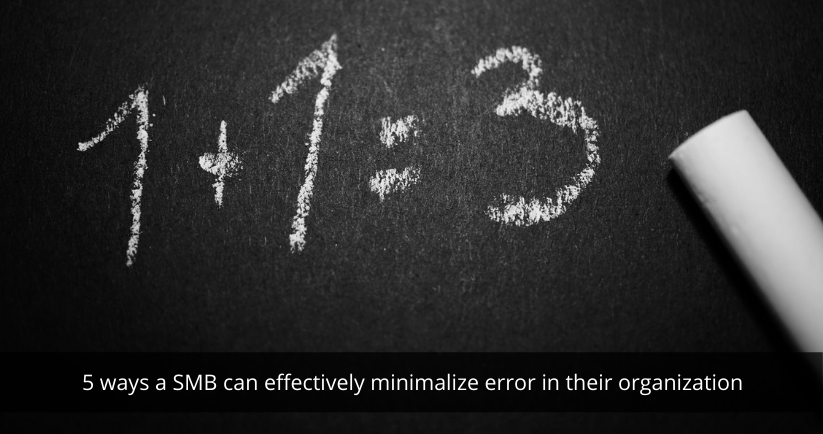A SME and a Startup walk on very thin path in their initial phase along with juggling a lot of activities at one go. A SME does take a lot of risk even when it has established its footing in the market, by challenging the big market share holders constantly. In doing so, the company is faced with a lot of loopholes created by their own hasty processes and procedures. They not only face the risk from lack of planning and procedures, but also data that is created due to it. There is a high tendency that the data will be duplicate and will not show the full picture of the organization.
There are many ways that the company can start to analyse and effectively minimalize error in their organization, here we have tried to point out the most commonly found errors that are overlooked by the SMEs and which later grow into bigger problems.
Problems faced by a SME:
- Lack of information – about their processes:
For managing different processes like inventory, manufacturing, sales, finances, etc., the SME usually has different systems which may or may not be integrated together. This is the biggest mistake for any SME. To grow and sustain, the company implements software as and when required and later on integrates it with each other or the parent application. This results in data duplicity which is very harmful for analysis for the company. If you are doing so, you need to take a pause and first analyse the data that has been generated, the growth path of the company and if they have outgrown the need of any software. In such a setup, even if the need for one software is outgrown, it can cause a problem to the whole setup since changing or upgrading one system can have an adverse effect on the others.
Solution: Today, there are a lot of ERP software which provide most of the functions as core modules in their package. For those unique to the SME, they can always opt for customizations. An ERP software provides a single platform and view to the management about all their processes and even helps them in forecasting efficiently. What the company needs to keep in mind are these pointers before finalizing an ERP vendor.
- Poor Procedures:
It is not a secret that SMEs usually have lesser resources available and due to this, they also tend to be lenient on their procedures which causes a bigger problem later on. Faulty procedures are the reason that the company can end up losing more time, resources and money. The problem arises due to the longevity of the duration that the procedures are practiced. If they have been ignored for a long time, they tend to become a habit and then, it will be difficult to impose newer procedures as there will be resistance met by the employees. As the company grows, it feels the need to implement a more streamlined process flow which will not only automate the mundane tasks but also help in reducing wastage. The question arises here is how to get it done.
Solution: When you get all your processes on one platform, the visibility is greater and you can easily pinpoint where the data leakages are happening. Taking cue from the previous point, ERP Software come with in-built workflows and processes which can guide you with the basic framework of the processes that need to be in place. For e.g. passing of invoice only after approval from head admin or notifications received by the management and the inventory head after the inventory has been blocked for a particular client. Setting right procedures in place, not only streamlines all the processes, but also increases the communication between the departments in the organization.
- Low Capital –
Lack of capital is a major issue with all SMEs and startups. It is now difficult to exactly pinpoint what can cause this. The reasons can be – lack of funding, difficulty to raise capital, huge investment in operations, fixed assets, longer operating cycle, expensive raw material, bargaining power of supplier, etc. Initially, cash is flown wherever it is needed without little or no analysis, and later on, these funds start making bigger holes in the pockets.
Solution: The solution is simple – have a cash plan in place. This may sound old and outdated but having a proper plan in place for investments, working capital, operating capital and petty cash beforehand gives the management the idea where most of the money is going to be used up and if there is a workaround to save money for other activities. Also, having a unified view of the sales pipeline can help the management to forecast and plan their finances better.
- Handling too many issues at the same time –
It is not a secret that a company needs to handle too many issues, processes and activities at the same time. From purchasing, inventory, services to hr and payroll, anything and everything can be an issue. How the management handles them can have influence on other related activities. Being a young SME, does put a lot of pressure on the management to get things working and right and in doing so, one person ends up multi-tasking. For a growing SME, that is a big red alert.
Solution: Business Intelligence and smart reporting is the key to analyse what all activities are not doing well and need to be prioritized. Sage ERP solutions help you generate reports for analysis, which can be used to plan strategies, keeping the past experience in mind which can be very beneficial to curb the errors.
- Scalability –
The aim of any company is to grow and expand either in products or the regions that it operates. The only problem here being – Most SMEs are not prepared for scalability. During any expansion, only the major and immediate issues like resources, space, funding are dealt with. Other major operational factors like setting up new branch transaction in the software or importantly – ERP software upgrading is done at the very end.
Solution: An ERP Software is like a catalyst to growth and not just an application. When you select the right software, it can help you in scalability and growth because the ERP software is itself is scalable and robust. An ERP software should be looked at like an asset and selecting the same should be done meticulously. It is a one-time investment which can help you grow, streamline your processes and reduce wastage for many years to come.
To know more about how can your SME reduce errors and grow, contact us here. You can also drop us a mail at sales@sagesoftware.co.in for free demo and consultation.




